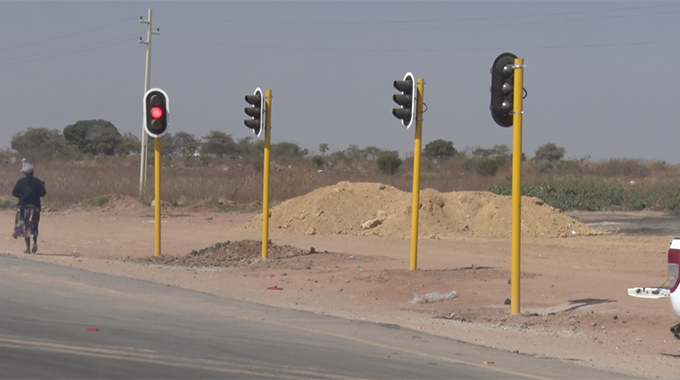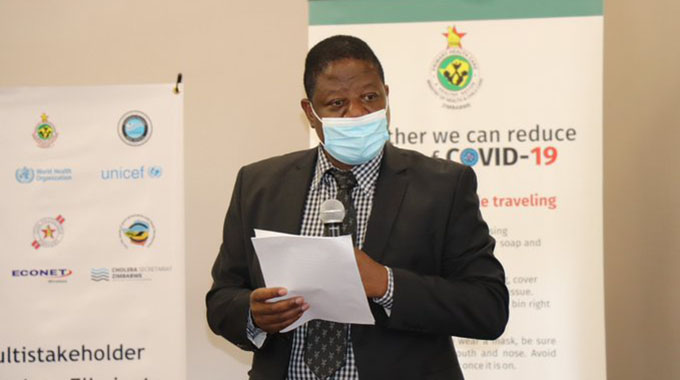Govt installs traffic lights in Mbudzi area

Freeman Razemba-Senior Reporter
MOTORISTS and commuters have hailed the installation of traffic lights at the intersections of detour roads constructed as part of the ongoing Mbudzi traffic interchange project that is being built under the Emergency Road Rehabilitation Programme (ERRP).
Apart from the traffic lights, a total of 14 bridges are being built at the interchange that is set to change the face of Zimbabwe.
Installation of traffic lights at intersections of diversion routes is being done to enable the smooth flow of traffic once the round-about is closed to pave way for other onsite civil works.
Detour roads were constructed to divert traffic from the construction site and motorists are excited with the progress.
In a statement, the Ministry of Transport and Infrastructural Development said the traffic lights will improve traffic flow.
“Installation of traffic lights on intersections for the Detour routes of Mbudzi interchange in progress to facilitate smooth flow of traffic,” reads the statement.
A Harare motorist, Mrs Faith Foya said she was happy that the road that was constructed in and around Hopley area is now complete with traffic lights.
Another resident, Mr Crispen Simanga applauded Government for the project saying it will help ease traffic congestion.
“This development will go a long in easing traffic congestion along the road. During peak hours we have been facing difficulties in passing through this road, I would like to thank the Government for coming up with this noble idea,” he said.
Mr Obert Mutasa also added that it was his hope that Government would also erect humps along the detour roads since it passes through houses.
“This will ensure that motorists will not speed and either cause accidents or hit and run pedestrians who normally cross the roads. They are a lot of children in this area and building humps will ensure their safety,” he said.
Ms Success Gumberu also said, “I would like to thank Government for the progress it is making in the reconstruction and rehabilitation of these roads. My only plea is that they are some other roads which also needs attention, such as some parts of Masotsha Ndlovu Way in Waterfalls and Amalinda Road up to Willowvale Road as they are also detoured roads that will assist motorists.”
The Mbudzi traffic interchange project is expected to ease congestion at the traffic circle which is a nightmare for motorist to pass through especially during peak hours.
The Second Republic’s robust infrastructural development drive dovetails with the country’s vision of attaining an upper-middle-income society status by 2030. At least 135 residential, industrial and commercial properties built near the Mbudzi roundabout in Harare will have to be demolished to pave way for the construction of 14 bridges and bridge-like structures at the new traffic interchange taking shape there, but the owners will get full compensation from the Government.
The Mbudzi roundabout is at the intersection of Simon Mazorodze, Chitungwiza, and High Glen roads that feed traffic from western Chitungwiza and many old and new suburbs into Harare city centre, as well as the heavy national and regional traffic on the Harare-Masvingo Highway.
The widening of the Beitbridge-Harare-Chirundu Highway, plus its reconstruction and rehabilitation, is a critical component of the North-South Corridor.
The project is being undertaken by five local companies and is being wholly funded by the Government.
By May this year, at least 313km of the rehabilitated highway had been opened to traffic.
The 971km highway has been divided into three sections: Beitbridge-Harare 570km (eight toll plazas), Harare-Chirundu 342km (six toll plazas), and Harare Ring Road 59km (three toll plazas).
Under the Infrastructure, Utilities, and Digital Economy cluster, Zimbabwe’s economic blueprint, the National Development Strategy (NDS 1) prioritises completion of road rehabilitation projects.
Previously, local companies were overlooked in terms of the awarding of tenders for big national projects.
President Mnangagwa recently said under the Second Republic, the Government took a bold, decisive, and revolutionary decision to fundamentally transform the country through the awarding of procurement contracts and tenders to local enterprises.










Comments